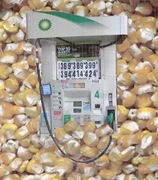Ethanol: Part of the Problem, Not the Solution
 Shortly, the EPA has declared that it will finally issue its guidelines regarding whether the amount of ethanol mixed into our gasoline at the pump will stay capped at 10 per cent (E10) or rise to 15 per cent (E15). As currently represented by the EPA and the press, the primary issue to be decided is whether the higher percentage of ethanol will harm our cars’ engines. According to the prevailing rhetoric, ethanol is good for us because it cuts our use of oil and reduces CO2 production, and there should be no downside to that.
Shortly, the EPA has declared that it will finally issue its guidelines regarding whether the amount of ethanol mixed into our gasoline at the pump will stay capped at 10 per cent (E10) or rise to 15 per cent (E15). As currently represented by the EPA and the press, the primary issue to be decided is whether the higher percentage of ethanol will harm our cars’ engines. According to the prevailing rhetoric, ethanol is good for us because it cuts our use of oil and reduces CO2 production, and there should be no downside to that.
But there is not merely one downside, but several, over which major environmental groups like the Natural Resources Defense Council and think tanks like the National Center for Policy Analysis are expressing deep concern. According to them, our real worry should be how the additional increase in the acreage of corn (our primary source of ethanol) to meet the additional demand created by E15 will further harm the environment, how it will affect rising food prices, and how it will consequently damage political stability throughout the world.
The kind of monoculture entailed in raising corn for fuel requires intensive use of fertilizer, pesticides, motorized equipment and huge amounts of water. The nitrites and other chemicals in the fertilizer and the pesticides foul our waterways and our potable water supplies. The fuel burned by the equipment used to plant, fertilize, reap, transport and process the corn into ethanol produces almost as much CO2 as it saves. According to a very detailed study published in Bioscience in July 2005, “The accompanying environmental impacts [of producing ethanol from corn] outweigh its benefits.”
But the damage of growing food crops to produce ethanol is not just environmental. In the last ten years, so much land has been taken out of food production worldwide to produce food stocks for ethanol that basic food prices have tripled throughout the world, causing hunger and contributing to political instability. It has also created major dislocations in the US. For the period 2007 to 2008, the Congressional Budget Office estimated that the increases in food prices attributable to the production of ethanol would raise the Government’s cost of food support for the poor, through such programs as school lunches and food stamps, by $900 million in 2009. The price of animal feed grains has also escalated with serious consequences. Referring to the CBO report, such usual supporters of agribusiness as the Grocery Manufacturers Association and the American Meat Institute said that, “As startling as these figures (the CBO’s) are, they do not even tell the story of the toll higher food prices have taken on working families, nor the impact higher feed prices have had on farmers in animal agriculture who have seen staggering losses and job cuts and liquidation of livestock herds.”
At the same time, the burning of vast areas of forests in the Amazon basin and throughout Asia to grow food crops in response to the increased demand and higher prices has generated huge amounts of CO2 and increased global warming. A study published in the magazine, Science, in February 2008 said that, “after taking into account expected worldwide land-use changes, corn-based ethanol, instead of reducing greenhouse gases by 20%, will increase (them) by 93% compared to using gasoline over a 30-year period.”
Many, though not all of the problems created by growing food crops to produce fuel could be mitigated if we made ethanol from non-food crops like switchgrass and cellulosic detritus like corn plant waste. It would require little extra water from our aquifers, no fertilizer to poison our rivers, no seeds taken from the food supply to press up prices, and would regenerate instead of exhaust the soil. Such a change could have minimal economic impact on existing ethanol production facilities because it would only require them to modify their distillation process, not shut them down. Meanwhile, the farmers who have been producing crops for biofuel could go back to producing food crops that the world desperately needs.
Until we can do that, ethanol is not part of the solution; it’s part of the problem.


